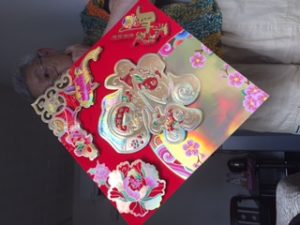17 January 2017 Tuesday
Up at six, showered, packed, breakfasted (oh yes), ordered the taxi, and ready to meet Guang at the Grand Canal Museum. Not. An hour later, no taxi. Finally, my taxi arrives to take me to the museum, just as Guang’s taxi arrives to bring her to my hotel. Why is that?
We opted for the museum and met one of the individuals who had been involved in making the Grand Canal a historic site, who had written a wealth of books and taken as many photos on the history of the Grand Canal. Hit pay dirt and great contact.
Guang gave me this colorful New Year’s decoration that must be hung with the pointy side above the fish upwards, This brings good fortune and prosperity to the house that displays it. (The photo does not catch the details well; I am learning the limitations of the IPhone camera.) Looks closely, and you can see the little fish in the upper right. The large center figure is fu, which means “good luck.” The New Year’s greeting is “Fu dao nien nien yao yu” 福到 年年有余. “May good fortune and prosperity come to you in the new year.” YU means “fish” and also “abundance.” DAO means “arrival” and “upside down,” which is why you turn the FU upside down to remind the viewer of the homonym and that in this case you are wishing to ensure the arrival of abundance. Is all that clear? Probably not. Chinese language is full of homonyms and subtle complications. I wonder if Westerners can ever appreciate the language.
Back to campus and lunch and off to Professor Shen’s office. The campus is built on wetlands, and at its edge is a wetlands preserve Thus, the many streams and lakes that lie throughout its landscape, but more interesting was the bridge-walkaway we went over to reach the building that houses the International Center offices: Large rectangular pillars spaced apart but closely enough to reach with the next step. The pillars rise high above the water level, and I imagine the height accommodates changing water levels.
The Hangzhou airport is a good hour away from Hangzhou, so I left the hotel before six by taxi (this time taxis were available). Asian airports are daunting. Big. Crowded Wall to wall to ceiling people. Someone spoke English, and I found the right line to wait in for my boarding pass.Then I waited in line to go through Immigration. Next, waited in line to go through security, Ticketing began at 7:20; the plane left at 9:20. I pretty much needed all that time – three hours – at the airport to prepare for the flight, plus the hour to get to the airport. Flying requires a great deal of prep time.
Nor are flights for the tired and weary. The Chinese never seem to be weary. In America, the USA traveller finds a seat in the waiting area and pulls out his Smart phone or his computer or his book (only the older generation pulls out a book) and quietly absorbs himself in his interests, He may talk quietly with his neighbor, but generally, things are pretty low key Not so in the Chinese waiting area. Everybody is interacting with everyone else in a very loud voice, The volubility continues as the Chinese wait in line to board. The Chinese are perpetually vocal and irrepressible. Everyone always seems to be at a party. “What is she saying? Why is she so angry” I asked Guang, when I heard the grandmother shouting at her grandson. “She’s not angry,” said Guang. Then I understood she was just being a normal Chinese person, speaking in a norma Chines voice.
The EVA flight was a delight. I flew cabin,economy, but the seats were roomy and comfortable, as well as attractive. The cabin of the plane was beautifully designed. And the staff! Everyone dressed in sharply pressed uniforms performing in a gracious, professional manner. Why cannot we have airlines like that in America? Flying EVA was a great experience, even though I landed dead tired and close to midnight.


